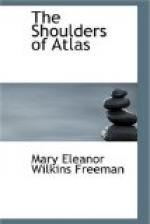“Yes, really lovely pearls; and such carved pink coral! And look at the dear old pearl spray in my hair. Wait; I’ll turn my head so the moon will show on it. Isn’t it dear?”
“Yes, it is,” replied Horace, regarding the delicate spray of seed pearls on Rose’s head.
“And only look at these bracelets and these rings; and I had to tie the ear-rings on because my ears are not pierced. Would you have them pierced and wear them as they are—I believe ear-rings are coming into vogue again—or would you have them made into rings?”
“Rings,” said Horace, emphatically.
“I think that will be better. I fancy the ear-rings dangling make me a little nervous already. See all these brooches, and the rings.”
Rose held up her hands and twirled her ring-laden fingers, and laughed again.
“They are pretty large, most of the rings,” said she. “There is one pearl and one emerald that are charming, and several of the dearest old-fashioned things. Think of poor Aunt Abrahama having all these lovely things packed away in a bureau drawer and never wearing them.”
“I should rather have packed away my name,” said Horace.
“So should I. Isn’t it awful? The Abrahama is simply dreadful, and the way it comes down with a sort of whack on the White! Poor Aunt Abrahama! I feel almost guilty having all her pretty jewels and being so pleased with them.”
“Oh, she would be pleased, too, if she knew.”
“I don’t know. She and my mother had been estranged for years, ever since my mother’s marriage. Would she be pleased, do you think?”
“Of course she would, and as for the things themselves, they are fulfilling their mission.”
Rose laughed. “Maybe jewels don’t like to be shut up for years and years in a drawer, away from the light,” said she. “They do seem almost alive. Look, you can really see the green in that emerald!”
Horace was trembling from head to foot. He could hardly reply.
“Why, you are shivering,” said Rose. “Are you cold?”
“No—well, perhaps yes, a little. It is rather cool to-night after the hot day.”
“Where have you been?”
“I walked to Tunbury and back.”
“That is seven miles. That ought to have warmed you. Well, I think we must go in. I don’t know what Aunt Sylvia would say.”
“Why should she mind?”
“I don’t know. She might not think I should have run out here as I did. I think all these jewels went to my head. Come. Please walk very softly.”
Horace hesitated.
“Come,” repeated Rose, imperatively, and started.
Horace followed.
The night before they had been on the verge of a love scene, now it seemed impossible, incongruous. Horace was full of tender longing, but he felt that to gratify it would be to pass the impossible.
“Please be very still,” whispered Rose, when they had reached the house door. She herself began opening it, turning the knob by slow degrees. All the time she was stifling her laughter. Horace felt that the stifled laughter was the main factor in prohibiting the love-making.




